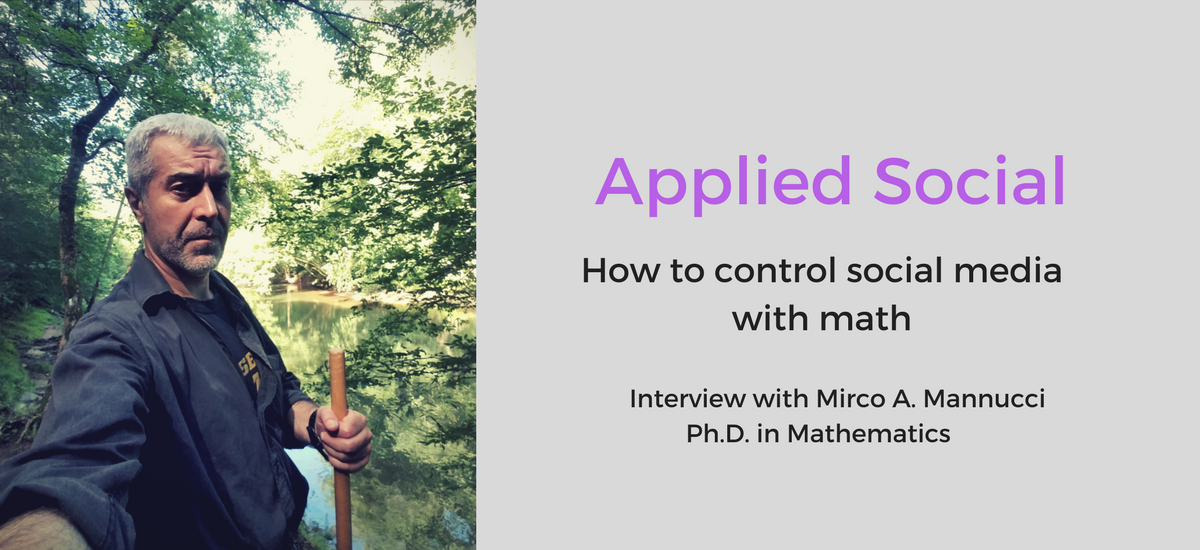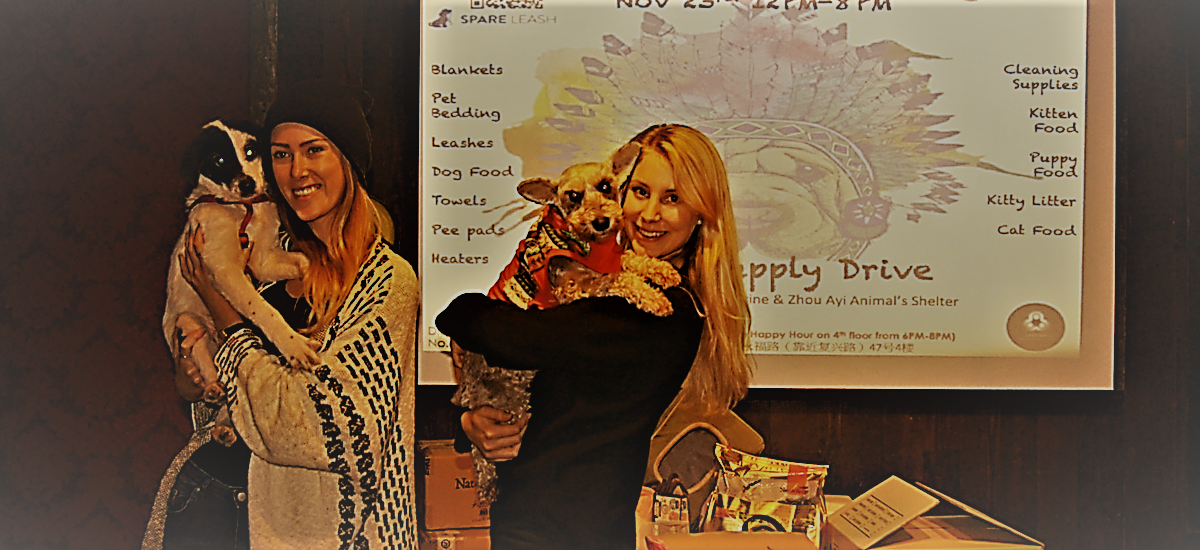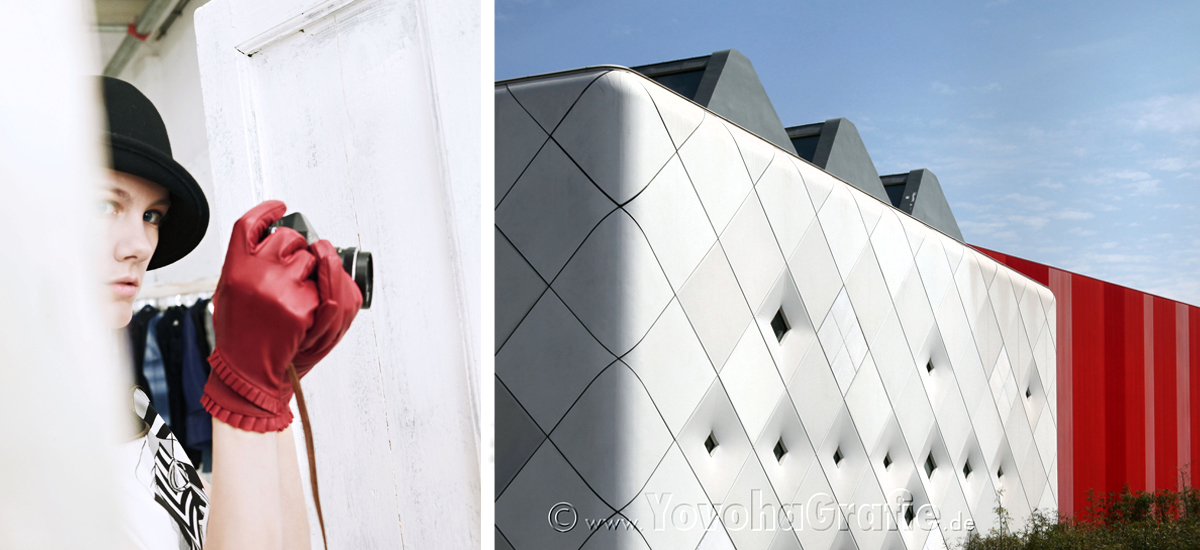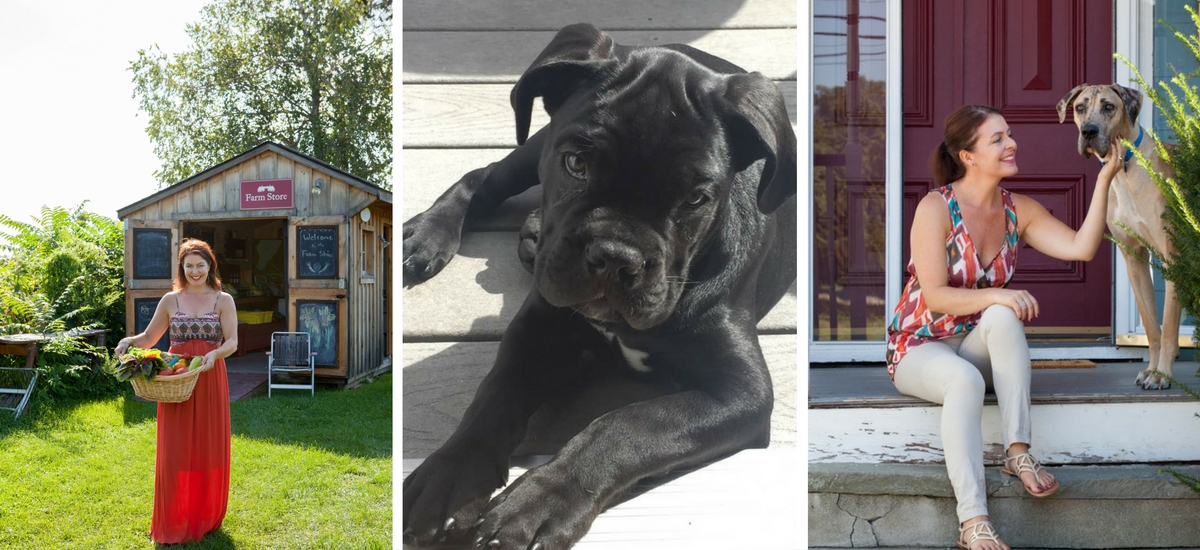Adding Value, Consulting, Digital Marketing, Digital Trends, Human Resources, Leadership, Modern Career
How to control social media with math
Mirco A. Mannucci is a Big Data Analytics Consultant, a CEO @ HoloMathics and a Ph.D. in Mathematics. His interdisciplinary background in the sciences and software engineering mingles with a burning interest in web social communities. Mirco is one of the authors of the research conducted at Chapman University exploring the concept of virality. The researchers were examining socially bonded clusters of people and subgroups on Facebook to identify the way to achieve the maximum reach of people. Today, Mirco and I will be discussing implications of big data for social networks, virality and the new world of super-heroes on social media.
Mirco, as a Big Data geek with a Ph.D. degree in Mathematics, how do you see social media transform in the next 5-10 years from now?
Great question to start off Dagmara! I think we should always begin with a touch of SF, because quite often what some mavericks are dreaming about now, becomes reality later. Social media means media which are social, media that are embedded in the very tissue of the social web. Now, where is the social web and where is it going?
I believe that the plumbing has already been done, we have plenty of large scales social communities. We also have small dedicated communities, we have various types of communication tools, we have, in a word, the proper infrastructure. But something is still lacking, isn’t it?
What is lacking is true SOCIAL INTELLIGENCE. By this I mean: just like there is a logical intelligence, there is a social one. Not many people are social intelligence geniuses, to be sure, and yet without it not much happens in one’s life, because social intelligence drives success.
So, here is my little piece of SF: I dream that very soon there will be another Social Web, let us say Social Web 3.0, which looks and feel like the existing one but with a glaring difference – it is smart. In this social web on steroids, people will get together, form teams, virtual ventures. All of that thanks to some help from the embedded social intelligence. It goes without saying that this would drastically impact social media and social advertisement as well. Highly focused communities would also demand highly focused media….
Will the social media 3.0 allow people with scarce social intelligence to do the work for them? Also, it is interesting that you see the future of social media 3.0 as a collaboration tool. Would not that be just another LinkedIn or Slack on steroids? Just another networking tool?
We definitely need a layer of intelligence on top of the existing social web to form a team of collaborators. I am not suggesting that a machine is better than humans at assessing whether some fellow is the right one to cover some new role in a team, but the machine could act as an advisor. I would not like machines to replace my judgment, but I would like machines to expand my possibilities. Imagine I need someone for my team who is extremely smart, knows how to speak Farsi and Icelandic, has a record of traveling in off-the-road destinations, and has a passion for new projects. What is my chance to find such a fellow now? Very slim, right? So, why not have a little help? There is another dimension involved. This is not a battle humans vs machine. Humans could recommend people too, and perhaps the machine would learn from them…
That is why you decided to build a platform that will enable it?
The platform, that I am building right now, is a “gaming platform”, in a sense. The chief difference is that instead of letting you play in an alternate world, it tries to turn you into a superhero in this one. Most of us live an unnecessarily boring life because we dream and leave our dreams in our closet. Why not add a little spice by being able to post your dreams adventures or join other’s dreams and team up with other superheroes? That is precisely what I want for the Social Web 3.0.

You mentioned that the Social Web 3.0 will impact social advertising. What is the biggest challenge while using social media for advertising and the way to overcome it?
The biggest challenge is that we are completely drowning in information: everywhere we are bombarded with ads, brochures, emails. The only way to mitigate this miserable state of affair is to provide value, highly specific value, to the individuals. If you shoot me an ad, most likely I do not want to hear it, but if you know what I am after and you leverage this knowledge by assisting me in MY objectives things are quite different.
On the other hand, retargeted ads can be pretty helpful. But, let’s drop the topic of ads and let’s get into something more entertaining. You mentioned that our lives are quite boring. What about viral content? It makes our life more exciting, or at least more fun. Getting viral is what everyone secretly dreams about, but they don’t want to admit it at loud. What do you think it takes to achieve viral growth? What could be the key variables that drive viral growth?
The paper which I have coauthored with my fellow researchers at Chapman University partially answers the question: to become viral it means to become like a virus. Viruses go from place to place in the body, being hosted not only by single cells but by entire organs. We essentially found a math model of virality which involves leveraging groups and communities instead of single individuals, to spread information around. To be sure, our research is simply a modest step in the right direction, we need more sophistication to provide a better representation of virality. But using interest groups and active web communities to spread your “virus” is certainly a great way to begin.
If the information is like a virus, looks like we should start spreading info locally, to the people that are close to us in a strictly geographical sense (but they are not our friends like on Facebook), and let them share the info to everyone globally. Do you see a potential in it, in a tool where everyone can share anything they like, but there are no other rules involved?
The beauty of the social web as it already operates now is that the notion of the locality has undergone great changes. When I grew up, several centuries ago, what was the chance of having a talk with you about social life? Close to zero. Now my nephews, who live in Milano, have friends in Spain or … China. Therefore, virality can take different clothes… however, having said that, there are certain types of information which must be spread locally, for the very simple reason that they are intrinsically local: why should I broadcast to the entire world the news that the guy next door offers the best pizza and a jazz concert for an incredible price? A guy in Peru could not care less…as for the second part of your question, I think we should have themes, channels through which information flows. I am not a big fan of Twitter’s model.
Neither am I. It’s way too messy and requires a constant time commitment. Mirco, if you were on a mission to predict the popularity of pieces of information that spread through the social media networks, where would you start?
Going back to the previous answer, I would try to understand which paths this piece of information follows to spread, and what is the relevance for folks and communities which dwell on mileposts along this path. Example: Suppose you try to spread some news about a service. You want to hit ONLY groups and folks for which this service could be intriguing, right? Nobody spreads info if they do not think it is “cool” and valuable…
Sure thing. But what is the probability to detect information big stories before they even happen?
It is extremely difficult to predict the future, especially where the human element is heavily involved. However, IF (big if!) I knew a lot about the folks and groups which receive this information, for instance, their tastes, goals, dislikes, then something can be predicted, especially if I do have a track record of previous scenarios.
Even if we knew the tastes, goals, dislikes, likes, interests of everyone in the earth, there are still many external factors that can mess your equation up. Is there anything certain about social media at all?
True, indeed the variables are almost infinite. But, as I have already said, I do not like Hal 9000 type of AI. I rather prefer Jarvis, the AI advisor of Tony Stark in Iron Man: Jarvis advises me, but I decide. If it makes mistakes, it will learn to adjust.
Using data and identifying new opportunities for unlocking it requires creativity. Could you give us an example of a product or a service that used creativity to bring data to the next level and unlocked its potential?
The obvious thing that comes to mind is Youtube. Not a rocket scientist type of technology, by any means, but one that has changed radically many aspects of our life: we can post anything, opinions, products tests, news, personal journeys. A video which is on your computer is your video, a video that is on Youtube is humanity’s video…a big difference.
There are plenty of tools on the market that helps identify the most influential authors (influencers), but after finding the right ones for your product or niche, the question emerges: How do we minimize the risk of not getting enough brand exposure, engagement or leads from this cooperation? We cannot be sure that our content will resonate well with the audience. What data would you be searching for to maximize the success of the cooperation with an influencer?
With a partner in crime, I have been working hard at a new platform to do exactly what you ask for. To be more precise, and going back to the previous part of this interview, I do not believe that getting the influencers on your side is enough. You need to also catch groups and communities for which what you want to sell is relevant, and communities have a life of their own. So, whereas as you said there are plenty of tools which are aimed at individuals who are “hubs” in the social web, this perspective is a bit too skewed toward single individuals.
You mentioned that community has a life on its own, can you share more details here…?
A community to me is like a collective mind: we are the neurons, but the whole has an intelligence of its own. It is the same everywhere: a single cell is one thing, an organ quite another. This is extremely important to understand if we really want to unravel the mysteries of the social web: if we stick to the view of the cell, we miss the organs…
Any golden tip for social media managers out there on achieving a consistent analytical approach?
Hire people, who understand both analytical tools and what these managers are trying to get.
What is the one social media metric you would die to measure, but no one out there came up with a solution yet?
How much what we offer aligns with what people really want.
I would risk a statement that people often times don’t know what they want…they search for one thing, but end up using or doing something completely different. People are irrational, don’t you agree?
You are right, but my measure is not what they want now, rather: after you show it to them, they like it or not? People are very bad at figuring out what they want before they see it but quite good at deciding what they like after they have played with it.
Information overload is killing our productivity. You have plenty of projects on your plate and you are surely a busy man. How do you achieve a better quality of information and remove the noise?
I will be honest with you: I was never good at that, I am someone who begins 1000 things and completes 2-3. But recently things have changed for me, simply because I realized (finally!) the truth: I do not have much time, nobody has, we barely have the time to do what we need and truly wish to do, and send everything else to hell.
…so, prioritizing.
Do not let information drive you, any information, drive your life and use the right info to go where you want to go.
How do you see the role of AI in data mining?
Well, the fact is, little by little we will let machines do the dirty job. Data sets are huge and complicated, so this is bound to happen (in fact, it is already happening). But I do not see the role of humans as something that is going to die anytime soon: humans are still needed to create new ways to model data, to make sense of what machines will find. Let us say that I am here an optimist: instead of substituting humans, I like to think of future AI as expanding our cognitive powers. But maybe I am a tad too optimistic. Time will tell.
They say that failures make us stronger. Could you share with us one of your failures and what did you learn from it?
There was a project I started in 2009 called MergingPot, the ancestor of this new thing. I spent a considerable amount of time building it, putting it on FB as an app, but eventually it died. Why? Truth is, I had no clue how to run a start-up, how to prioritize, how to engage people, and also my timing was not right. In fact, everything was wrong EXCEPT the core idea, which was way ahead of time. Now, if I was a complete fool, I would give up. Far from it…I always loved the hero who has been beaten up to a pulp and yet makes a last comeback 🙂
Do you want more blood? I could go on forever. What is more interesting is WHY I failed. Chiefly by lack of consistency: when you start something, you MUST complete it, no matter what.
Ouch! You even don’t know how much I agree with you on that one…thanks for sharing!
And of course, thank you a ton for the interview, Mirco!
Thank you Dagmara! I had a lot of fun.
Adding Value, Leadership, Location independent, Modern Career, Relocation
About entrepreneurship in China with co-founders of Spare Leash
Originally from Sweden, Elsa Medin relocated to Shanghai four years ago to study Chinese. She decided to stay in China and did her bachelor degree in international business. With her motto being “If I cannot find the path, I will create it!” she launched Spare Leash right after graduation. Elsa has a dog named Betsy, a schnauzer adopted in Shanghai in October 2016. She also fosters dogs.
Erin Leigh studied public relations, advertising and applied communication at Western Michigan University. She came to China after graduating from college. She has been living in Shanghai for over five years, working in PR and marketing, before co-founding Spare Leash. Erin has Oliver (labrador mix), Betty (mini schnauzer), and Max (terrier mix). They used to be foster animals, but she ended up adopting them. Erin usually fosters one more dog every month. She also rescues kittens; she bottle-feeds them and looks after them while searching for adopters.
Spare Leash is dedicated to making life easier for pets and pet owners by providing loving and trustworthy pet sitters in Shanghai. Their services are safe, reliable and cage free. The company was founded in Shanghai, in 2016. In the same year, Spare Leash was awarded by Time Out Love Shanghai for Lifestyle Service of the Year.
How Spare Leash started?
Elsa: It began in 2016 when I wanted to adopt a dog from the street in Shanghai. I was still a student, and I was going traveling for a whole month. None of my friends could take care of him. Finally, I didn’t adopt this dog. However, I started to think how we can all help each other looking after pets when we travel. I had an idea, and I spent a few months thinking about Spare Leash and how I can make that happen. I had mutual friends with Erin. She was facilitating pets’ adoptions in Shanghai.
Erin: One day, Elsa texted me out of the blue, saying: “I need to talk to you. Meet me for lunch”. We met at one of my favorite restaurants, Kommune. Elsa told me about her idea. It was also a part of her university project.
Elsa: I had a class called Entrepreneurship, and that’s how I started to look at it from a business perspective. My initial idea was a pet hotel, but I wasn’t 100% happy with that and kept on brainstorming. I went to Australia for a month, and because I didn’t adopt the dog, I was thinking about it during the whole trip. I was doing my research, writing down my ideas and a business plan. When I came back, I met Erin.
Erin: Elsa nearly had a business plan and the avenue laid out, as well as the name and the logo. Right away I said: YES. The very next day we were in my living room, my three dogs were running around, and we were starting the business. It was around early April. I had just quit my job in PR.
Elsa: I was in the last semester of my Bachelor’s degree majoring in business. I had in my final exams. My final thesis was about the WeChat business, so I was going to many business events and learning from hands-on entrepreneurs.
Erin: We first built a website, which took a month. Then we had a launch party – a charity event co-organized with Best Friends China.
Elsa: We got our first client during this event. The first interviews with sitters happened in Erin’s apartment.
Adding Value, Modern Career, Relocation
How to volunteer and engage with a local community during your busy life abroad? #AddingValue series
About Tiziana:
Tiziana Figliolia is the Sr. Vice President, Global Business Operations and Finance at PTC. She is also the President and Board Member of International Professional Women Association (IPWS) in Shanghai, and a speaker on the topic of gender diversity, equality and women empowerment (Women TEDx Shanghai Salon, Shanghai International Forum on Women’s Development).
Tiziana is a global leader with 20 years of experience working with technology companies publicly traded and startups, with a wide range of strategy, planning, finance, customer support, sales & operations, R&D, and business partnering related responsibilities. As a native Italian and after graduating in Economics, Tiziana realized that moving to the USA was the right choice to springboard her career. Being a naturally curious and open minded person, Tiziana relocated a few times with her family and progressed her career around the world. Currently, she lives with her husband and son in Shanghai, a city, which she finds the most international and cosmopolitan from all the international cities.
About IPWS:
International Professional Women’s Society is a non-profit organization that provides professional women with different platforms to connect and foster personal and professional growth. IPWS has a community reach of more than 2000 women.
***
Tiziana talks with Coachify about her motivations to volunteer, engage with a local community and empower professional women, as well as how it helped her to live a fulfilled life. One of the lessons we can learn from her is: choose a volunteering project or community that resonates with your life vision and passion.
Tiziana, how did you become interested in IPWS?
After working for some time in China, and completing my MBA, I felt there was a void in my life, which needed to be filled. I’ve accomplished a lot professionally, I have a great family, but I needed more to fulfill my purpose. More than the traditional work/life balance, I believe in living an integrated life where professional, personal (family) and social (giving back to the community) are interconnected and a measure of who we are, what we do and how we accomplish our life goals. These are three very fundamental parts of who I am. At the time I felt that the social aspect was incomplete. I asked myself: How do I give back? How do I make an impact on the community? I started to look around, and when my friend Margot invited me to an IPWS event, I joined. I enjoyed the crowd and the ambiance of the event and worked my way to join the Board of Directors and become the President of the organization, now for the past four years. IPWS was and still is an excellent fit in terms what I was trying to achieve.
Adding Value, Location independent, Modern Career, Relocation
About photography, life in China, and adding value with Yolanda vom Hagen. #AddingValue series.
Yolanda vom Hagen is originally from Düsseldorf, Germany. Her photographic main focus is on interior, industrial and documentary photography. She studied photography and design at the University of Applied Science Dortmund and the Beijing Film Academy. She was commissioned as the official press photographer of the German Pavilion at the Expo 2010 in Shanghai. Yolanda is fluent in German, Chinese, and English, which enables her to work independently in most parts of the world.
Yolanda sees herself as a preservationist of humanity’s current lifestyle and being. Her vision is to capture this generation’s contemporary environment for future generations.
Yolanda, when did you discover your passion for photography?
When I was a little kid my mother gave me a camera to take some pictures while I traveled with my brother on our own. After we would come home, my parents would develop the pictures and I would have the memories from the trip. The preservation of my experiences gave me the ability to share with my parents what I experienced, seen, and done. I did not have an outlet for my deep need for sharing, but taking pictures gave me the ability to preserve something not only from my life but also from others’ lives. It became a way to communicate. For my eighteenth birthday, my father surprisingly gave me a proper camera. I started to play around with it. When I was nineteen I needed to decide what I want to study after high school. I looked at architecture, psychology, and photography and then tested all of them during my summer vacation.
How did you test them?
In Germany, we have something called Volkshochschule which is a summer school/ workshop program. I participated in one photography workshop. Another workshop was about architecture. I also interviewed an architect and I asked him about his job.
He said: “There are so many people studying architecture nowadays that you will end up behind IKEA’s desk selling furniture.” This, plus my fear of math contributed to my decision to choose photography rather than architecture. I thought this would give me the ability to meet, communicate and work closely together with people, which is what a psychologist also does… However, photography gives access to a variety of different topics and fields I can work in. My father had ten or fifteen jobs in his life. I thought photography might give me the option to travel, see different cultures, work with different people and update myself to fulfill my need of learning and steady creative and personal development.’
Your father had so many jobs throughout his life. You picked up one job, which has so many jobs in it.
Exactly. There are so many fields I can work in. It took me some time to figure out my skills set in photography. The studying aspect made me really confused about which field of photography I want to work. I’ve failed a lot. Every single semester I had to redo my work two or three times. Only interior photography was OK. And there … we are coming back to architecture.
Adding Value, Coaching, Modern Career
Interview with a vegan lifestyle coach and blogger, Sunny Gandara. #AddingValue series.
A multi-passionate entrepreneur, Sunny Gandara is a life design coach and a certified health coach through the Institute for Integrative Nutrition. Sunny, a native of Norway, is a professionally trained cook and holds a certificate in Plant-Based Nutrition from eCornell as well as a professional Culinary Certificate from the Institute of Culinary Education in NYC. She is a Certified Personal Trainer and Fitness Nutrition Specialist through NASM, a Certified Wine Educator and Specialist of Spirits through the Society of Wine Educators, and a holder of the DWS Diploma through the Wine and Spirits Education Trust (WSET).
A huge part of her work is vegan lifestyle coaching and blogging. She talks with Coachify about her fascinating journey of going vegan and helping others to do so.
Sunny, how did you become a vegan lifestyle coach and blogger?
To me, becoming a vegan lifestyle coach and blogger was the result of having worked across three other industries first; I started out in the music industry where I worked as an international marketing and publicity director and traveled the world with celebrities, to becoming a professionally trained chef and later on a wine educator and specialist. I had my own catering company, Fork and Glass for five years, and while I loved both food and wine, I still felt that some aspects of my interests, skill set and experience were not utilized to the fullest.
Then in between, I decided to compete in amateur body building shows for fun as a way to get my body back after several years of eating too much and moving too little, I was inspired to get my personal trainer certificate. A lot of women would contact me wanting me to coach them, but also on nutrition. I didn’t feel qualified to handle the nutrition part, so I was inspired to seek out nutrition schools and landed upon the Institute for Integrative Nutrition. I got certified as a health coach through them, and just before I joined I had decided to go vegan. I am first and foremost vegan for the animals, but I was thrilled to learn about all the health benefits of this lifestyle too. I found that a lot of people had healed themselves from serious health conditions through eating a whole food, plant based eating and was what inspired a lot of people seeking out this lifestyle. As a professionally trained chef, I started veganizing a lot of my traditionally animal based recipes, and gained a pretty big following, and from there on had the idea of helping others discover this wonderful way of living. A vegan lifestyle is not just limited to your diet and eating plant foods, it’s also living a cruelty free, compassionate and conscious life.
Adding Value, Modern Career
Empowering Women through Photos – Modern Career Woman – Chapter V by Heather Schnacke
Adding Values Series: How to add volunteering to your busy life abroad?
Every day, I work in a very normal business environment. While it has its perks, there are many days where, although I am busy, it doesn’t quite feel like I am saving the world. Or even making a small contribution. Although I have nice co-workers and enjoy the actual work, I also want to feel like I am doing something meaningful. Making a difference in someone’s life who really needs it the most without just quitting my job and moving to Africa. While some are called to that, I know that that is not always the answer.
Therefore, I decided to do something. I am really passionate about anti-human trafficking and I have been involved in several organizations wherever I have lived in relation to this cause. Just recently, I have been asked to go on a trip to India with one of the organizations to empower women who were trapped in slavery (now who, fortunately, are rescued) via photography. To help bring them back to life in a creative outlet and feel normal again.
While I was honored to be asked, I thought, where am I going to get that money? And should I go with work? Is it the right timing? What if I am too tired to get on that long flight right after Christmas break? Will I be ready?
Financially speaking, they recommended for me to fundraise the money. They gave me some good advice and while it’s something new for me, I am excited to see where this goes.
- I created a gofundme page. You can see it here (www.gofundme.com/heatherschnacke) and shared why I want to go to India through this organization, and how I can help. I use videos, photos, and text to tell my story to hopefully inspire those to give – I really want people to see the importance of my role and cause.
- I thought of other ways to raise money – starting with things I am good at and passionate about. I asked a local gym if I could host a zumbathon for free at their place and all of the costs from the people who sign up would go towards this trip. They said yes! Most places are so happy to help a good cause. You can join us: https://www.facebook.com/events/666379836860502/
- I asked for sponsorship. I told my boss about the cause and she was so impressed that she suggested that I share with the company and that they would probably help! I did not expect that reaction. I have also asked another company that in exchange for articles that they would sponsor me – I presented it as a win-win case (which it is) and I meet with them this week as they are very keen to the idea.
There many other things you can do for causes like auctions, small parties, or online contests, but these are just to name a few. Fundraising and sponsoring can be quite scary and intimidating topics, but in my experience thus far, I have been pleasantly surprised. People want to help because they feel that same way you do in regards to contributing. And they can contribute through you. Once I started doing this process and asking for support, I became energized by the whole process and now feeling ready to go as ever!
I would be honored if you read more of my story here – please donate if you can and share this page. It would mean a lot to me and the women in India. (www.gofundme.com/heatherschnacke)
And let me know what you decide to raise money for – share it on this blog and we can support one another. That’s what it’s all about, right?
Written by Heather Schnacke
Pictures: Canva
Adding Value, Coaching, Consulting, Human Resources, Leadership, Location independent, Modern Career, Relocation
What do coaching, opening a new café, and creating a time saving app have in common?
What do coaching, opening a new café, and creating a time saving app have in common?
Too difficult to answer?
How about this one: what do all the above have in common PLUS establishing an internet shop, volunteering in Africa and running photography workshops – all at the same time?
As a career coach, I might be slightly more attuned to these ideas I hear literally every day – from my friends, acquaintances, and clients. What is this all about, you might ask. Is it about who has the best idea? Who is the most creative? Maybe who can execute something and bring it to life? Or perhaps about picking and focusing on just one idea? I can see something on a much deeper level: people desperately long to add value to the world and be truly useful to others. When others around me say ‘I want to open a vegan bed and breakfast’ or ‘I want to create a job search app’ or ’I want to be a life coach,’ I hear “I want to add value.” They want to change the world – or at least help improve parts of others’ lives. At the same time, we would like to use our unique talents, be creative, have fun, and earn for living (except, of course volunteering). Earning while doing something valuable and enjoyable seems to be the trickiest part. I think many of us still believe that they can not earn well while doing something they love. Others think they first have to sort out their own careers and financial security and only THEN they can start adding value and changing the world.
Is adding value and helping others a luxury you can only afford after you yourself become established and successful?











